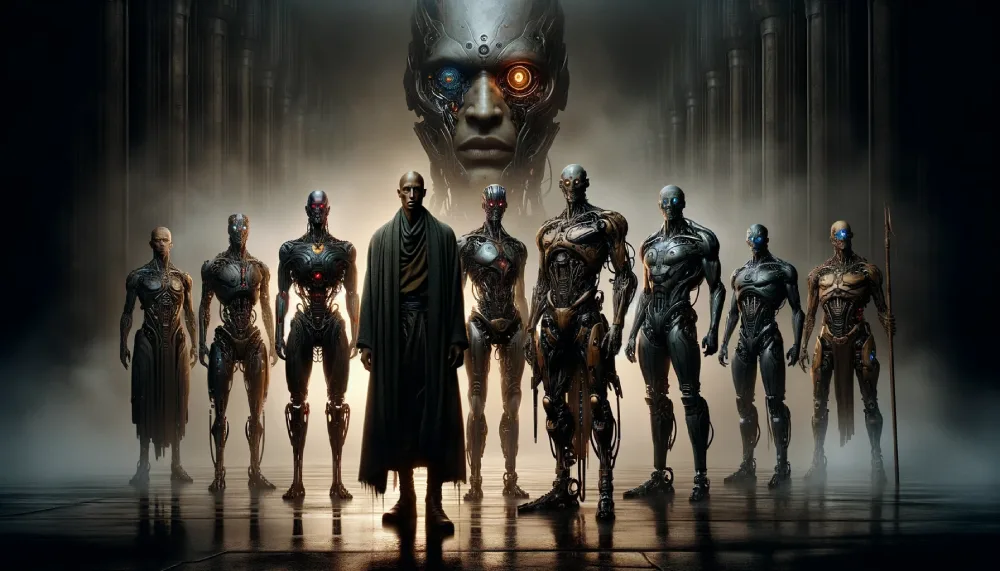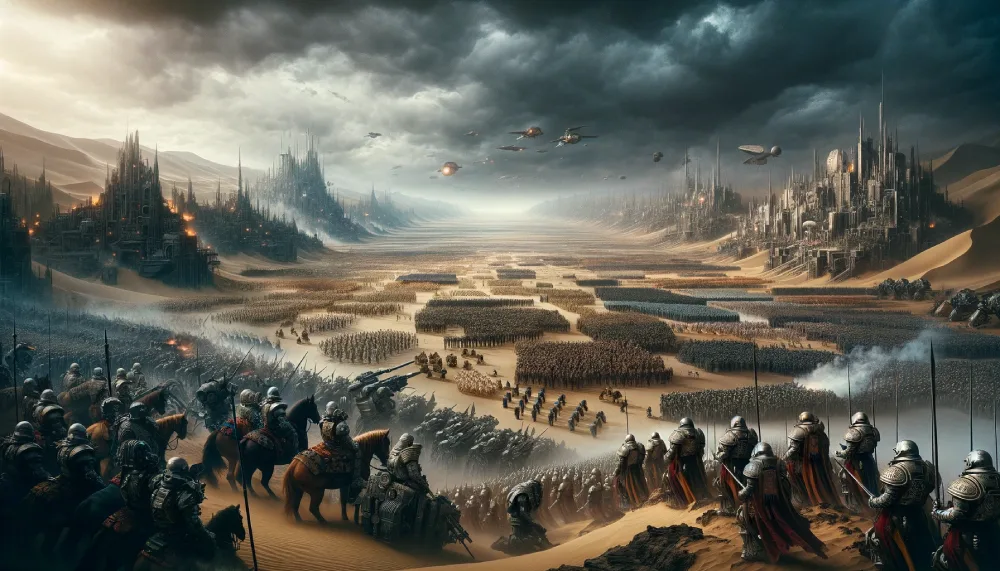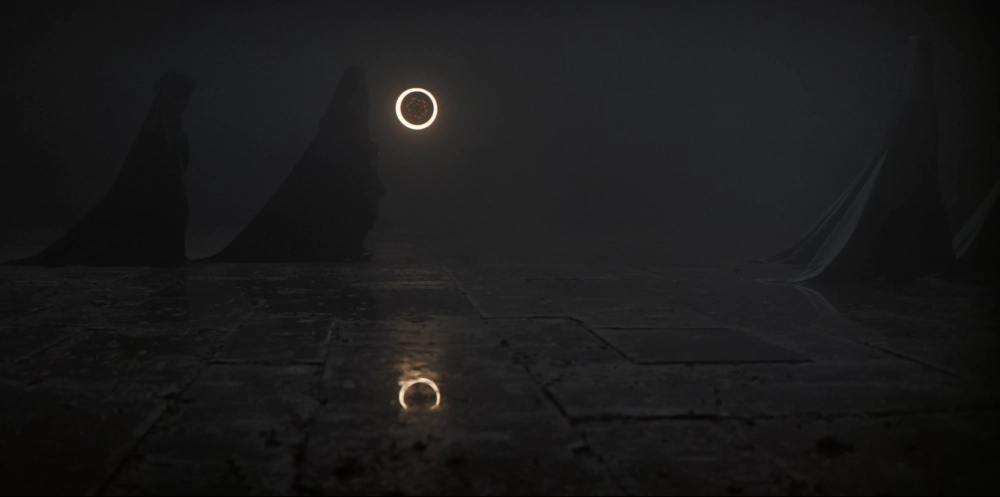There are many layers of history in Frank Herbert’s Dune universe, each adding depth and dimension to the epic narrative. For those unfamiliar with the books, understanding this universe is difficult because it spans tens of thousands of years.
But in this article, I’ll try to give a spoiler-free overview of the history of the Dune universe and how we got to the events that are now happening in the universe on the big screen.
How much time does it take?
Like many other universes, Duniverse has its timeline. It is divided into “Before the Founding of the Spacing Guild” (BG) and “After the Founding of the Spacing Guild” (AG). The universe spans at least 20,000 years, from humanity’s early steps into space and exploration of other planets to 10191 AG, when the events shown in the movie Dune Part One begin.
To understand how this time relates to “our” Earth timeline, since the events of Dune take place not in a galaxy far, far away, but a world in which Earth plays no small part, we can say that the Butlerian Jihad began around 11200 AG. According to Dune’s chronology, these events take place in 1187 BG.
The key events:
- 11300s BG (1800s AD): The Luddites
- 11201 BG (1961 AD): The humanity reaches space
- 5000 BG (8160 AD): The Sandtrout is brought to Arrakis, a watter-plenty planet with wet climate.
- Around 4000 BG (9160 AD): The Arrakis turn to Dune, a desert planet whose water is deep underground and absorbed by huge sandworms.
- 2500 BG (10660 AD): The founding of an Old Empire.
- 2200 BG (10960 AD): The first Cogitors.
- 1500 BG (11860 AD): The founding of Bene Tleilax (Tlulaxa League).
- 1450 BG (11910 AD): The beginning of Arrakis colonization.
- 1400 BG (11960 AD): The melange is found on Arrakis.
- 1300 BG (12060 AD): The birth of Twenty Titans.
- 1287-1182 BG (12073-12178 AD): The Time of Titans.
- 1182-201 BG (12178-13159 AD): The Rule of Omnius and Synchronized Worlds.
- 223 BG (13182 AD): The founding of the House Atreides and the House Harkonnen.
- 201-108 BG (13159-13252 AD): The Butlerian Jihad.
- Around 100 BG (13260 AD): The founding of Bene Gesserit.
- 88 BG (13272 AD): Battle of Corrin and the founding of Corrino Padishah Empire.
- 5 BG-1 AG (13355-13360 AD): Galactic civil war.
- 1 BG/AG (13360 AD): Foldspace Shipping Company takes the name Spacing Guild.
- Around 97 AG (13457 AD): The Great Convention is signed.
- 10175 AG (23535 AD): The birth of Paul Atreides.
- 10191 AG (23551 AD): The events of the Dune: Part One. The House Atreides becomes the Landlords of Arrakis.
Humanity, colonizing space
The Dune universe, it’s an extension of our world. Therefore, everything starts the same way as in our world. In 1961, mankind launched a man into space for the first time, just as in our world the first space journey was made by Yuri Gagarin. Then, there were many thousands of years of gradual space exploration as mankind moved further into the universe and colonized new worlds. Around 5000 years before the founding of the Guild (around 8160, according to our chronology), mankind reached Arrakis.

This water-rich planet had an excellent climate but was not particularly interesting from the point of view of colonization due to its remote location and lack of minerals. It was to this planet that standouts were brought by chance. They got there from another planet.
At this time, mankind used computer systems, artificial intelligence, and thinking machines to travel between planets and control ships. This allowed for the creation of the Old Empire: an amalgamation of colonized worlds that existed because of humanity’s ability to implement and use automated systems and computer machines. It was a technology that allowed humanity to make long flights, perform complex calculations, and reduce production costs. But like any technology with artificial intelligence and “thinking systems,” it had risks.
While space travel was possible, the planets were still fairly isolated. The fact that they were populated by settlers from Earth, who found themselves on unfamiliar and often not very friendly planets, created additional problems. One such problem was the rise of cults, esoteric consciousness, and various delusions. Throughout the Old Empire, tens of thousands of new cults arose on various planets, in which esotericism intertwined with religion, new prophets appeared, and people succumbed to hoaxes.
All this could not pass without a trace for the Old Empire, which, with each decade, came into cultural and religious decline.
Cogitors
In the year 2200 BH (10960 AD), a technology called Cogitors was created that allowed a person’s brain to be transferred into a separate vessel where it could continue to exist after the body died. Very quickly, this became an honorary title given to the best thinkers in the Empire, along with the ability to continue their thoughts even after the death of their biological body. Most Сogitors led reclusive lives and were not involved in politics or military affairs. Still, this technology became the basis for creating Cymeks: robotic bodies connected to the human mind by Thoughtrodes that converted brain impulses into electrical signals.
The Arrakis become Dune
The Sandtrouts, brought to Arrakis along with settlers looking for a new paradise planet to live on, quickly increased in size, consuming the planet’s water and turning it into Dune. The settlers on Arrakis at the time were forced to adapt to the new conditions, evolving into the Fremen, who learned to live in the sands and obtain water from the planet’s atmosphere. Gradually, they mutated to adapt to the new atmosphere of Arrakis, which began to be dominated by nitrogen, making it almost impossible to breathe without special devices that oxygenate the human body. After a few thousand years, the Fremen would learn to ride sandworms, and the original knowledge of these people would be distorted, and they would begin to see Arrakis as the ultimate goal of their wanderings.

When melange was first found on Arrakis, its properties were not appreciated, as space travel was done using “intelligent machines.” But after the Butlerian Jihad and the banning of intelligent machines, it would become the basis for commerce throughout the universe and the only substance allowing navigators to guide ships safely through Fold Space.
Bene Tleilax
The Tleilaxu, as they are sometimes called, originated on a separate planet, creating a cult based on genetic modifications. To do this, they use the Axlotl tank, which is a woman stripped of a limb as well as her spinal cord and brain. Over time, the Tleilaxu have learned to create gholas, genetic copies of dead people who can be programmed to perform specific actions.
The Tleilaxu, because of their strange ethics, were rejected by the rest of the universe, which treated them with contempt. But their knowledge of genetic engineering technology has made them a “necessary evil,” causing most Great Houses and merchants to trade with them to have access to genetic engineering technology.
In time, the Bene Tleilax’s main adversary and opponents will be the Bene Gesserit, who will hunt down their technology to put it at the service of their ideas.
The Time of Titans
The Titans were 20 humans who used cymek technology to turn themselves into a human-machine hybrid. They used their rule to fight heresy on the planets of the Old Empire and bring peace and a more peaceful existence to the entire galaxy. Initially, the Titans relied on philosophy and humanist ideas to create a more just world. But in a very short time, they turned into tyrannical rulers.

Relying on “sentient machines” that had limited autonomy, on one world, they gave such a “thinking machine” too much autonomy, and it was able to realize itself, which led to the Titans being subjugated by Omnius, an artificial intelligence that, taking their ethics and treatment of biological humans as servants, created Synchronized Worlds that Omnius, a sentient machine, ruled.
Omnius could not destroy the Titans because of the inherent limitations of his program, so instead of destroying them, he turned them into agents of his will. Most of the Titans during Omnius were idle, opening lavish temples and monuments in their honor.
The Rule of Omnius
The Reign of Omnius covers a dark era in the history of the “Dune” universe, when an artificial intelligence, a self-proclaimed eternal emperor, established hegemony over much of the known universe. Omnius, a central computer with self-awareness, took control of multiple planets, using armies of machines and robots to suppress and control humanity. This era, also known as the time of the Synchronized Worlds, is characterized by a ruthless suppression of individuality and freedom, where humans were stripped of rights and subjected to mechanical oppression. The reign of Omnius caused the formation and strengthening of the anti-machine movement, which later led to the Butlerian Jihad, humanity’s revolt against machines, and liberation from the tyranny of artificial intelligence.
Omnius was not a single system but a “thinking machine” that existed on multiple planets, synchronizing periodically through transmitted data carriers.
The Butlerian Jihad
The Butlerian Jihad was a rebellion of the remnants of the Free Worlds, also known as the League of Nobles, against Omnius and his Synchronized Worlds. During the nearly century-long war, Omniuses were destroyed on various planets and other “thinking machines”, “war robots”, and cymeks. The Jihad also destroyed the four remaining Titans, and the technology to create “intelligent machines” was banned, including calculators and rudimentary computing.

This also made intergalactic travel impossible via Fold Space, causing an increase in the importance of “spice” from Arrakis, which was now the only way to enable space travel. It also led to the creation of the Mentant Order, people who could control reality and perform complex calculations, and led to the dawn of the Ixian civilization, the Bene Gesserit and Bene Tleilax. The Ixians, despite the ban on creating sentient machines, continued to create computing machines, often in direct defiance of the ban.
At the same time, the Bene Gesserit developed the mental faculties of their followers, including powers of foresight and prediction. And the Tleilaxu continued genetic experimentation to create more perfect humans.
The political structure also changed significantly, and the Empire became a feudal structure ruled by feudal houses, the Emperor, and the Cosmic Guild.
Each house controls one or more planets, being a feudal lord but formally subordinate to the Padishah Emperor of House Corrino. The Emperor’s power is far from absolute, as he has to balance the interests of the House, the Bene Gesserit, the Guild, and other influential communities. To do so, the Emperor is often forced to enter into alliances to achieve his goals and maintain a balance of power. It could be said that House Corrino is just the noblest and most influential among the other houses.

In addition, control of Dune, which any House does not own, is critical to the Emperor. Instead, he periodically changes the landlord of Dune, transferring control of it from one House to another. What we saw in Dune: Part One is the transfer of Dune from the previous landlord, House Harkonnen, to House Atreides. Of course, this transfer constantly provokes conflicts between Houses for control of Dune, as it is the source of spice, arguably the most important product in the universe.
The atomics
Atomics, various types of nuclear weapons, including explosive devices and munitions, are capable of inflicting immense damage. Despite their destructive power, the use of Atomics in military conflicts is strictly taboo due to generally accepted laws and regulations set by the great houses of the Galactic Landsraad, a sort of parliament composed of representatives of the powerful houses.
According to the Great Convention, the document governing international relations between the great houses, the use of atomics against inhabited planets or to destroy planets is wholly forbidden. This taboo serves not only to prevent mass destruction and genocide but also to maintain a balance of power between the houses, preventing armed conflicts from escalating to absolute destruction.
Their destructive power is immense, including the ability to completely pulverize a planet to turn it into scraps of dust and rock. In addition, atomics can emit so-called J-rays, which burn out the eyes of anyone who saw the flash of the explosion.
However, atomics are still a deterrent and can be used in exceptional circumstances, such as against non-human threats or for certain strategic tasks that do not violate the Great Convention.
House Atreides owns atomics capable of destroying at least 50 planets.






